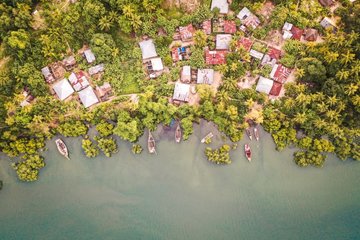Climate change increases migration at the expense of the poor
A climate game developed by Max Planck researchers shows that global cooperation can be possible – although not without effort
In 2018, around 16 million people were displaced by extreme climate events. People from poorer countries flee more often as a result of climate events. Scientists at the Max Planck Institutes for Evolutionary Biology in Plön and Meteorology in Hamburg have used a climate game to investigate how extreme climate events combined with poverty affect the migration of people to rich countries if the participants are also expected to finance measures against climate change. In this economic experiment, the representatives of the wealthy countries were rarely able to stop climate change and migration. In contrast, the representatives of the poorer countries are prepared to support a minimum level of climate protection by the rich.

Climate change is accompanied by extreme events such as floods, heat waves, and tropical hurricanes. “Such events will become more frequent and intense. This will also increase climate-induced migration”, says Jochem Marotzke from the Max Planck Institute for Meteorology in Hamburg. Climate change and the resulting events affect poorer population groups the most. But combating it is a global challenge. This is partly why effective climate protection is difficult to implement.
To investigate the connection between climate protection measures, climate-induced migration, and poverty, the scientists recruited 410 students from the Universities of Hamburg and Kiel to participate in a climate game. The players represented the inhabitants of either a wealthy or a poor country. As starting capital, the representatives of the rich country received €40 each. Those of the poor country received €20.
The participants were able to invest this and any money earned through harvesting in the prevention of “dangerous” climate change simulated in the game. This is the case, for example, when a certain average temperature is exceeded. The participants were allowed to keep the remaining amount for themselves provided that the goal of averting “dangerous” climate change was achieved by the respective group after 20 rounds of play.
Investment in climate protection
Each participant could contribute €2 or €4 per round for the environment or nothing at all. The climate goal was achieved if everyone invested an average of €2. Such a system favours freeloaders who do not want to spend anything on climate protection but benefit from the successful climate protection by others.
At the beginning, representatives of the wealthy country achieved a crop yield twice that of the poorer country per round. In each round, the poor inhabitants were able to try to migrate to the rich country. At least four “rich” participants were able to jointly achieve a fixed sum to block migration. Here too, freeloaders were able to try to benefit from the efforts of others.
But this often led to not meeting the target sum for blocking the migration, which then took place. With each migrant, the crop yield decreased in the rich country and increased in the poor country until there was a distribution of two inhabitants in the poor country and eight in the rich country. The yields per inhabitant were then equal, and there was no longer any poverty migration. This “Nash equilibrium” – in which no participant can gain by a unilateral change of behaviour if the behaviours of the others remain unchanged – was always achieved, albeit delayed by the occasional successful blocking.
In the game, only the representatives of the poor country suffered from climate events with a probability of ten or 20 percent. This resulted in a crop failure for them in each of three consecutive rounds. When a climate event was announced, the number of migrants also increased in equilibrium beyond pure poverty migration. The representatives of the rich countries tried to block the migrants. During the climate event, the efforts for climate protection of the poor decreased, while those of the rich increased – but not to the necessary extent.
Missed goal
Most groups did not achieve the climate goal and lost their money, although the rich had far greater financial reserves than the poor. “As long as there is hope that others will raise money while you save, some people will obviously run the risk of losing in the end”, says Manfred Milinski.
Surprisingly, once a certain minimum contribution by the rich is exceeded, the poor are at least willing to try to raise the missing amount to achieve the climate protection goal. Global cooperation could therefore be possible as long as the economically powerful make efforts to slow climate change.












